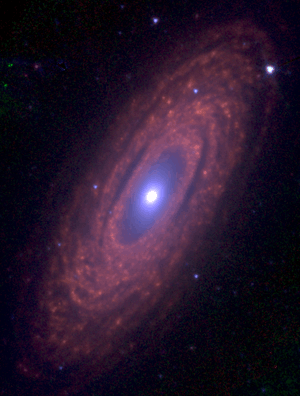NGC 2841
Coordinates: ![]() 9h 22m 02.6s, +50° 58′ 35″
9h 22m 02.6s, +50° 58′ 35″
| NGC 2841 | |
|---|---|
|
Infrared image derived from data taken by the Spitzer Space Telescope. | |
| Observation data (J2000 epoch) | |
| Constellation | Ursa Major |
| Right ascension | 9h 22m 02.6s[1] |
| Declination | +50° 58′ 35″[1] |
| Redshift | 638 ± 3 km/s[1] |
| Type | SA(r)b[1] |
| Apparent dimensions (V) | 8′.1 × 3′.5[1] |
| Apparent magnitude (V) | 10.1[1] |
| Other designations | |
| UGC 4966, PGC 26512[1] | |
NGC 2841 is an inclined unbarred spiral galaxy in the constellation Ursa Major. Initially thought to be about 30 million light years distant, a 2001 Hubble Space Telescope survey of the galaxy's Cepheid variables determined that it was approximately 14.1 megaparsecs or 46 million light years distant.[2]
Structure
Structurally, NGC 2841 is a giant spiral galaxy with properties similar to those of the Andromeda Galaxy.[2] It is a prototypical flocculent spiral galaxy, a type of spiral galaxy whose arms are patchy and discontinuous.[3]
NGC 2841 is also noted for its large population of young blue stars, and few H II regions.[4]
-

Amateur Image of NGC 2841.
-

Hubble image of NGC 2841.
LINER emission
NGC 2841 contains a low-ionization nuclear emission-line region (LINER), a type of region that is characterized by spectral line emission from weakly ionized atoms.[5]
See also
| Wikimedia Commons has media related to NGC 2841. |
- NGC 2841 on WikiSky: DSS2, SDSS, GALEX, IRAS, Hydrogen α, X-Ray, Astrophoto, Sky Map, Articles and images
References
- 1 2 3 4 5 6 7 "NASA/IPAC Extragalactic Database". Results for NGC 2841. Retrieved 2006-10-04.
- 1 2 Macri, L. M.; Stetson, P. B.; Bothun, G. D.; Freedman, W. L.; et al. (September 2001). "The Discovery of Cepheids and a New Distance to NGC 2841 Using the Hubble Space Telescope". Astrophysical Journal (University of Chicago Press) 559 (1): 243–259. arXiv:astro-ph/0105491. Bibcode:2001ApJ...559..243M. doi:10.1086/322395. ISSN 0004-637X.
- ↑ "A Near-Infrared Atlas of Spiral Galaxies", Debra Meloy Elmegreen, "CH3. Discussion" (accessed 23 April 2010)
- ↑ Marochnik, Leonid; Suchkov, Anatoly (1995-11-01). Milky Way Galaxy (1st ed.). Routledge. p. 267. ISBN 2-88124-931-0.
- ↑ L. C. Ho; A. V. Filippenko; W. L. W. Sargent (1997). "A Search for "Dwarf" Seyfert Nuclei. III. Spectroscopic Parameters and Properties of the Host Galaxies". Astrophysical Journal Supplement 112 (2): 315–390. arXiv:astro-ph/9704107. Bibcode:1997ApJS..112..315H. doi:10.1086/313041.
